 Shocking moments when PLA's weapons open fire
Shocking moments when PLA's weapons open fire Famous Lanzhou beef noodles
Famous Lanzhou beef noodles Armed Police hold anti-terrorism drill in SE China's Xiamen
Armed Police hold anti-terrorism drill in SE China's Xiamen Harbin Int'l Ice and Snow Festival opens
Harbin Int'l Ice and Snow Festival opens 'Jin' named the word of the year by cross-strait netizens
'Jin' named the word of the year by cross-strait netizens Chinese scientific expedition goes to build new Antarctica station
Chinese scientific expedition goes to build new Antarctica station
 Chinese naval escort fleet conducts replenishment in Indian Ocean
Chinese naval escort fleet conducts replenishment in Indian Ocean 17th joint patrol of Mekong River to start
17th joint patrol of Mekong River to start China's moon rover, lander photograph each other
China's moon rover, lander photograph each otherSEOUL, Jan. 10 -- Deadlock continues on the Korean Peninsula despite some signs of thawing mood as both South Korea and the Democratic People's Republic of Korea (DPRK) were reluctant to make concessions.
Kim Jong Un, top leader of the DPRK, made the first stride to improve frosty ties between the two Koreas, saying in his New Year ' s address that Pyongyang will"create atmosphere to ameliorate the relations between the DPRK and South Korea."
South Korean President Park Geun-hye responded positively to Kim's speech, saying at her first New Year's press conference on Monday that there has been no change in her position that she can meet with the DPRK leader at any time if the meeting is necessary to prepare for the era of peace and reunification on the Korean Peninsula.
Park proposed a reunion of separated families around the Lunar New Year's Day, providing an opportunity for the DPRK to actively push for the inter-Korean talks."Park's remarks on the need for family reunion can be interpreted as providing North Korea (DPRK) with justifications to actively participate in the inter-Korean dialogue,"Cheong Seong-chang, a senior analyst at the private Sejong Institute in Seoul, said via e-mail on Friday.
The give-and-take of the hopeful words was cut off after Pyongyang rejected Park's proposal for the humanitarian event. The DPRK's Committee for the Peaceful reunification of Korea on Thursday sent a notice of rejection, saying that if the humanitarian project is to go on successfully, obstacles should be removed and atmosphere should be created.
The committee said that the family reunion could not be held under an environment in which war drills continue on the South side and massive joint military exercises happen, noting that issues proposed by the DPRK, believed to be the resumption of the tour to the DPRK's scenic resort Mount Kumgang, should be tackled together.
Cheong said that Kim Jong Un showed a hostile attitude toward the joint military drills between Seoul and Washington, citing Kim ' s New Year speech during which the DPRK leader described the joint drills as an military exercise for northward nuclear invasion. "Given Kim's hostile attitude toward the South's military drills, it is hard to imagine a situation for North Korea (DPRK) to accept the family reunion proposal before the end of the joint military drills between the United States and South Korea," said Cheong.
Since 2010, Seoul and Washington have been conducting their joint military drills dubbed Key Resolve and Foal Eagle annually, which Pyongyang has denounced as preparations for a northward invasion.
The Key Resolve is a command post exercise between the United States Forces Korea and the South Korean armed forces. The Foal Eagle refers to a combined field training exercise conducted by troops of South Korea and the United States under the auspices of the Combined Forces Command.
Defense Ministry's deputy spokesman Wi Yong-seop told a routine press briefing Friday that the Key Resolve and Foal Eagle are a regular and annually planned joint military drill of"a defense nature,"noting that those are aimed at improving command and combat capabilities of the joint forces in preparations for the possible all-out war on the Korean Peninsula.
Meanwhile, South Korea repeated its request to the DPRK for the reunion of families separated by the 1950-53 Korean War, reaffirming its willingness to deal with the humanitarian issue separately from other issues such as resuming the tour to the Mount Kumgang resort.
Unification Ministry spokesman Kim Eui-do told reporters Friday that there has been change in its stance that the resumption of the Mount Kumgang tour should be pushed ahead separately from the family reunion, reiterating its call on the DPRK to settle the unresolved issues such as making clear the cause of the incident and safety of tourists.
The tour to Mount Kumgang, launched in 1998, was halted in July 2008 when a South Korean female tourist was shot dead by a DPRK solider for venturing into an off-limit area.
The spokesman said that South Korea's offer to hold the family reunion around the Lunar New Year's Day was made after considering the old age of separated families, noting that the reunion would have cured pains of the elderly and would have become the first step to improve inter-Korean ties.
Kim said that if the DPRK really wants to enhance inter-Korean relations, the country should turn its words into action and respond positively to Seoul's proposal.
 In photos: Ten 'tuhao' devices in 2013
In photos: Ten 'tuhao' devices in 2013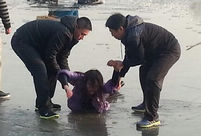 College students saved from an ice hole by brave citizens
College students saved from an ice hole by brave citizens Gallery: Top 10 box office hits in 2013
Gallery: Top 10 box office hits in 2013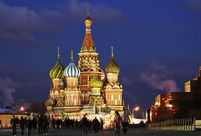 Beautiful churches around the world
Beautiful churches around the world Yang Mi, Hawick Lau hold wedding in Bali
Yang Mi, Hawick Lau hold wedding in Bali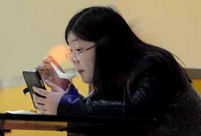 'Phubbing' people seen everywhere
'Phubbing' people seen everywhere World's biggest snack shop in China
World's biggest snack shop in China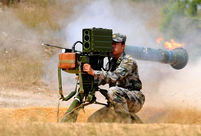 Shocking moments when PLA's weapons open fire
Shocking moments when PLA's weapons open fire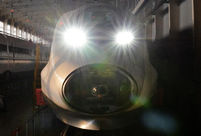 World's fastest train CRH380A assembled in E China
World's fastest train CRH380A assembled in E China Top 10 box office hits in 2013
Top 10 box office hits in 2013 In photos: Ten 'tuhao' devices in 2013
In photos: Ten 'tuhao' devices in 2013 Real estate tycoon measures PM2.5
Real estate tycoon measures PM2.5  'I am on a journey to lose weight'
'I am on a journey to lose weight' 'Cute' artifacts exhibited in Nanjing Museum
'Cute' artifacts exhibited in Nanjing Museum Advanced Chinese weapons that stepped into spotlight in 2013
Advanced Chinese weapons that stepped into spotlight in 2013Day|Week|Month